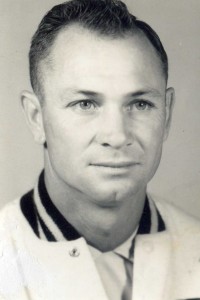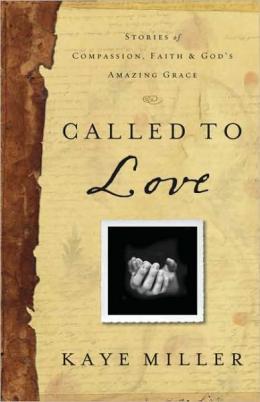 Somebody in Florida was pretty up-tight. Back in the day The Florida Baptist Witness ran an article about a book titled, Making Peace With Your Past: Help for Adult Children of Dysfunctional Families. The book was written by a pastor, Tim Sledge, who grew up in a dysfunctional family. This pastor realized that events in his childhood still produced a great deal of trauma and difficulty in his present life. The book tells what he learned in his journey toward wholeness and offers a biblical approach for others who deal with the same sort of thing.
Somebody in Florida was pretty up-tight. Back in the day The Florida Baptist Witness ran an article about a book titled, Making Peace With Your Past: Help for Adult Children of Dysfunctional Families. The book was written by a pastor, Tim Sledge, who grew up in a dysfunctional family. This pastor realized that events in his childhood still produced a great deal of trauma and difficulty in his present life. The book tells what he learned in his journey toward wholeness and offers a biblical approach for others who deal with the same sort of thing.
One week later, enter one angry letter-writer. How could the Witness even think of highlighting a book that relies on psychology rather than on the Word of God? How could the writer not see that psychology and Christianity are based on two totally different suppositions? The Biblical answer to our past is just to forget it, like God does.
Alrighty then. How’s that working out for you?
Think about it. Is it unscriptural for hurting people to try to get a grip on their past? Is there any such thing as Christian (def. – “under the lordship of Jesus Christ) psychology (def. – “the study of human behavior”)? Is there something spiritually wrong with me, or with you, if we can’t “just forget it, like God does?”
Maybe my Florida friend should take a lesson from the hurricanes that routinely blow through that state. In a matter of hours, those deadly storms can destroy lives, property, and a lot of dreams. No one there escapes the fury.
But then an interesting thing happens. [click to continue…]
(Giveaway alert: Keep reading to learn how you can win a free copy of John Smoltz’s new book, Starting and Closing.)
 When I was in Virginia Beach a couple of weeks ago, I had a happy surprise. That Sunday afternoon I watched the Braves finish off a sweep of the Cardinals in St. Louis in what may be their last win of the season. I especially enjoyed having a chance to hear John Smoltz as one of the broadcasters. I told my son later how impressed I was that this man, who our whole family has enjoyed as a professional athlete, had brought that same professionalism (and humor) to the broadcast booth.
When I was in Virginia Beach a couple of weeks ago, I had a happy surprise. That Sunday afternoon I watched the Braves finish off a sweep of the Cardinals in St. Louis in what may be their last win of the season. I especially enjoyed having a chance to hear John Smoltz as one of the broadcasters. I told my son later how impressed I was that this man, who our whole family has enjoyed as a professional athlete, had brought that same professionalism (and humor) to the broadcast booth.
Imagine my surprise when I’m roaming the hotel at midnight in search of something not made by Pepsi, and there, 928 miles from St. Louis, is John Smoltz, having a midnight burger and fries.
“Andy!” he said. “How long has it been?”
“Forever, dude!” I replied. “I just saw you on TBS this afternoon! What are you doing here?”
“I’m here for an interview in the morning. Hey, I heard you spoke at the Servant Leadership Roundtable. How’d it go?”
“It went well, I think.”
“That’s awesome. Hey, I’ve been keeping up with the LifeVesting blog. I read it every chance I get.”
“Seriously? Man, that’s awesome. Did you tell Tommy we named our cat after him?”
“Yeah, he thinks that’s hilarious. Says you ought to name your next dog after Maddux and call him Mad Dog.”
+++++++
Okay, so… um… it didn’t exactly go like that. [click to continue…]
A year ago at this time I found myself reading and hearing a lot of people emotionally drop-kicking 2010 to the curb. “Good riddance!” they all said. “What a sorry year! Here’s hoping 2011 will be better.”
I haven’t checked yet this year. Who knows? Maybe that’s what you’re supposed to say so that the first of January feels even more exciting and hopeful. I just found myself really surprised by all that for some reason.
Don’t get me wrong. I saw plenty of reasons to howl at the moon about how awful things were. But I also plenty of other reasons to look back with gratitude and – dare I say it? – satisfaction.
I decided to be more proactive this year. Believing that 2012 is going to be an extraordinary year, I spent a little time looking back at the past 12 months and sharing a few lists of things that helped shape my heart and my world.
But first, let me tell you a very quick story that captures the essence of this year for me. A few months ago I was out driving in the middle of nowhere on a fall West Texas day. It was about 4:30 in the afternoon. Just off the highway, to the right, I saw three does feeding. I was surprised to see them out this early, but enjoyed the scene.
A couple of miles ahead, this time on the left, a saw a deer’s backside pointed at me as it was grazing beside the road. “Oh,” I thought, “another doe.” Raising its head, this is what I saw: [click to continue…]
(From the forthcoming book, Coach Lightning)
 (Note: Anybody can be an influence to people sitting right in front of them. But it takes a special kind of character to continue to shape lives you first touched 50 years ago. The following is an excerpt about the way Morris Brown did that, and how his influence lives on to this day. You can see other excerpts here and here.)
(Note: Anybody can be an influence to people sitting right in front of them. But it takes a special kind of character to continue to shape lives you first touched 50 years ago. The following is an excerpt about the way Morris Brown did that, and how his influence lives on to this day. You can see other excerpts here and here.)
Benjamin Disraeli, the British statesman, once said, “The greatest good you can do for another is not just to share your riches, but to reveal to him his own.” That’s what you discover when you talk to the people whose lives were touched by Morris Brown. You hear the language of wealthy people. And they’ll tell you that Coach Brown was instrumental in revealing their riches to them.
One of the greatest contributions any leader, teacher, or friend can make in terms of influence is to “raise the bar” in the pursuit of excellence. Morris did that time and time again. Don Hunt calls him a “beacon in my heart and soul” to this day. From the days of Little League baseball until today, Don says, Coach Brown’s life and actions remind him to strive to be the best person that he can be.
It’s interesting to note that in all the conversations or interviews about Coach Brown’s influence, nobody went to a chalkboard and started drawing the X’s and O’s of a football locker room. Morris influenced players and students by first influencing them as people. As he helped raise up a generation of excellent people, the on-field or on-court play took care of itself. [click to continue…]
(From the forthcoming book, Coach Lightning)
 Mention Morris Brown’s name around Jones County, Mississippi to anybody who knew him, and they’ll probably reply, “Oh, you mean Coach?” Not much chance of somebody piping up and saying, “He was my Social Studies teacher!”
Mention Morris Brown’s name around Jones County, Mississippi to anybody who knew him, and they’ll probably reply, “Oh, you mean Coach?” Not much chance of somebody piping up and saying, “He was my Social Studies teacher!”
But don’t let the labels fool you. Coach was always a teacher at heart. And while a football field or basketball court may have been his favorite classrooms, they certainly weren’t his only ones. There were precious few, if any, specialists in rural education in the 1950s. But that was fine with Coach Brown. He willingly embraced teachable moments wherever the situation called for it.
Just ask Dale Holifield, who grew up on a small farm in Jones County. At age 11, Dale was so shy he could have been considered antisocial. Outside of farming, he participated in very few activities. Even when he went hunting and fishing, he usually did it alone. All of that changed one summer day at the W. C. Houston grocery store, across from Shady Grove School. Dale was getting a cold RC cola to drink and chatting with Bubba Houston, the store owner’s son. The time came for Bubba to go to baseball practice, and he invited Dale to come along. Dale reluctantly accepted, and joined Bubba at the small practice field behind Bubba’s house. Hoping not to be noticed, Dale took a seat on the ground under a shade tree to watch the practice.
He didn’t sit very long. [click to continue…]
 How do you respond when you are told every day what a nobody you are? When the people who are supposed to be your friends and co-learners in school instead ruthlessly call you demeaning names, and you feel you have no one to talk to?
How do you respond when you are told every day what a nobody you are? When the people who are supposed to be your friends and co-learners in school instead ruthlessly call you demeaning names, and you feel you have no one to talk to?
Brenda Poage gets that. And Brenda is a somebody that you need to know. Wife and mother, author and visionary, Brenda – like most of us – is who she is because of how she has responded to some painful experiences in her life.
Brenda is a LifeVestor.
Kids can be cruel, but you don’t have to explain that to Brenda. From the time she started school in her small Texas town, she was mercilessly bullied by other kids in school. Having to play academic catch-up required that Brenda attend remedial classes. And she became the brunt of some pretty mean name calling and bullying.
So when educators and parents today start quoting statistics that as many as half of all school children are bullied in some way, Brenda does more than raise her hand as “Exhibit A.” She did something about it. And that’s how Ima Nobody Becomes a Somebody was born. [click to continue…]
 One of our inside family jokes has to do with a certain child of ours who had the hardest time simply apologizing or admitting she was wrong.
One of our inside family jokes has to do with a certain child of ours who had the hardest time simply apologizing or admitting she was wrong.
(This same child, as a two-year-old, used to wear a t-shirt with the picture of a well-known TV character who had a similar problem. The most he could ever do was say, in his coolness, “I was wr-r-r-r-r.” I wonder if the t-shirt rubbed off somehow.)
Anyway, the conversations would go something like this:
“You need to tell her/him you’re sorry.”
“But I didn’t mean to.”
“It doesn’t matter – you did it. Say you’re sorry.”
“But I didn’t mean to.”
“But you did it.”
“It’s not my fault.”
“SAY IT!”
“I DIDN’T MEAN TO!”
Where Could She POSSIBLY Learn Something Like That?
To this day, we haven’t really understood what a simple apology symbolized to this child, but she wasn’t buyin’. But let’s face it. We all come by our reluctance to admit fault pretty honestly. [click to continue…]
 April 1 is coming, and with it is the release of Kaye Miller’s new book, Called to Love – Stories of Compassion, Faith, and God’s Amazing Grace. I was privileged to work with Kaye on it, and can tell you, it’s a must-have book. Kaye masterfully gives love a face, a Name, and a set of instruments with which to express it. You can pre-order called to love at Amazon here, or at Barnes & Noble Online here.
April 1 is coming, and with it is the release of Kaye Miller’s new book, Called to Love – Stories of Compassion, Faith, and God’s Amazing Grace. I was privileged to work with Kaye on it, and can tell you, it’s a must-have book. Kaye masterfully gives love a face, a Name, and a set of instruments with which to express it. You can pre-order called to love at Amazon here, or at Barnes & Noble Online here.
The following is a composite description of one of the most profound love-related experiences Kaye walked through. On some level, I think you’ll be able to relate. Enjoy! And order the book!
Most of us will not be required to love to the extent that it costs our physical lives. But we will have to love enough to be willing to give up our own desires, our time, our preferences, our schedules and much more. But that is a small price, knowing that we were loved by someone named Jesus Christ, who thought we were worth dying for.
This came home to me in a particularly poignant way in my responsibilities as an intensive care nurse. I heard God’s call loud and clear as He called me to work with the leprosy of our day. I will never forget the first time I cared for a patient with AIDS. I thought, “God, I can’t so this! I have a family – small children who need me. Please don’t ask me to do this!” I stood outside the door to the room of my first AIDS patient for what seemed like an eternity, just praying: “Lord what do I do?” Then I remembered what Jesus did, and what my father did. They willingly, lovingly, touched the lepers of their day. I could do no less.
I took a deep breath and opened the door – [click to continue…]
 Somebody in Florida was pretty up-tight. Back in the day The Florida Baptist Witness ran an article about a book titled, Making Peace With Your Past: Help for Adult Children of Dysfunctional Families. The book was written by a pastor, Tim Sledge, who grew up in a dysfunctional family. This pastor realized that events in his childhood still produced a great deal of trauma and difficulty in his present life. The book tells what he learned in his journey toward wholeness and offers a biblical approach for others who deal with the same sort of thing.
Somebody in Florida was pretty up-tight. Back in the day The Florida Baptist Witness ran an article about a book titled, Making Peace With Your Past: Help for Adult Children of Dysfunctional Families. The book was written by a pastor, Tim Sledge, who grew up in a dysfunctional family. This pastor realized that events in his childhood still produced a great deal of trauma and difficulty in his present life. The book tells what he learned in his journey toward wholeness and offers a biblical approach for others who deal with the same sort of thing.


 One of our inside family jokes has to do with a certain child of ours who had the hardest time simply apologizing or admitting she was wrong.
One of our inside family jokes has to do with a certain child of ours who had the hardest time simply apologizing or admitting she was wrong. April 1 is coming, and with it is the release of Kaye Miller’s new book, Called to Love – Stories of Compassion, Faith, and God’s Amazing Grace. I was privileged to work with Kaye on it, and can tell you, it’s a must-have book. Kaye masterfully gives love a face, a Name, and a set of instruments with which to express it. You can pre-order called to love at Amazon
April 1 is coming, and with it is the release of Kaye Miller’s new book, Called to Love – Stories of Compassion, Faith, and God’s Amazing Grace. I was privileged to work with Kaye on it, and can tell you, it’s a must-have book. Kaye masterfully gives love a face, a Name, and a set of instruments with which to express it. You can pre-order called to love at Amazon